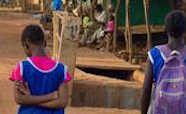Research expertise in health disparities and inequalities in New Zealand, and beyond, is a key strength of our public health research departments, and a number of research groups.
Visit the listings of our research groups below, or check out our featured projects.
Featured research projects
The Burden of Disease Epidemiology, Equity and Cost-Effectiveness Programme (BODE3)
 The Burden of Disease Epidemiology, Equity and Cost-Effectiveness Programme (BODE³) was a Health Research Council funded research programme. It has studied the health and wider societal gains, costs, cost-effectiveness and equity impacts of health sector interventions, and has built capacity in modelling of health sector interventions.
The Burden of Disease Epidemiology, Equity and Cost-Effectiveness Programme (BODE³) was a Health Research Council funded research programme. It has studied the health and wider societal gains, costs, cost-effectiveness and equity impacts of health sector interventions, and has built capacity in modelling of health sector interventions.
Health Research Council funding for the BODE3 Programme officially finished in January 2022. This programme of research has produced important evidence on the health impacts and cost effectiveness of a range of policies and interventions for Aotearoa New Zealand. It has also supported many staff in developing skills in the field of epidemiological/health economic modelling. Going forward, there are a number of modelling research projects that will be continuing in the Department of Public Health and these projects will form a research network: SiHMNet: Simulation Health Modelling Network. Additional work that builds on BODE³ tobacco modelling is being led by the University of Melbourne.
Email bode3@otago.ac.nz
Web otago.ac.nz/wellington/publichealth/research/bode3
Cancer and Chronic Conditions (C3) research group
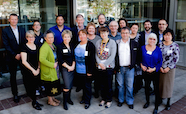 The Cancer and Chronic Conditions (C3) research group is a collaborative group of researchers working at the interface between public health, health services research, and clinical medicine. Our work includes a range of projects aimed at reducing the impact of cancer and chronic conditions on population health and health inequalities through policy and health system change.
The Cancer and Chronic Conditions (C3) research group is a collaborative group of researchers working at the interface between public health, health services research, and clinical medicine. Our work includes a range of projects aimed at reducing the impact of cancer and chronic conditions on population health and health inequalities through policy and health system change.
Ko te rōpū rangahau mō te Mate Pukupuku me ngā Māuiui Tūroa (C3), he kāhui kairangahau e mahi tahi ana ki waenga i ngā ao o te rāngai hauroa tūmatanui, te rangahau ratonga hauora me te rongoā haumanu. Kei te kōkiri mātau i ētahi kaupapa e mahi ana ki te whakaiti i te pānga o te mate pukupuku me ngā māuiui tūroa ki te hauora o te taupori me ngā ōritenga kore o te hauora mā te whakarerekē i ngā kaupapahere me te pūnaha hauora.
Email jason.gurney@otago.ac.nz
Web otago.ac.nz/wellington/publichealth/research/cancercontrol
Cancer Society Research Collaboration | Te Rōpū Rangahau ō Te Kāhui Matepukupuku
 We aim to reduce the incidence and impact of cancer in New Zealand, and to reduce cancer-related inequalities.
We aim to reduce the incidence and impact of cancer in New Zealand, and to reduce cancer-related inequalities.
We work in close coordination with the Cancer Society of New Zealand to prioritise the research we conduct, disseminate our findings, and advocate for world-leading cancer prevention, care and support.
Our partners include Massey University, Michigan State University, The University of Melbourne, and Victoria University of Wellington.
Email louise.signal@otago.ac.nz
Web otago.ac.nz/cancer-society-research
Centre for International Health
The Centre for International Health facilitates and promotes research to contribute to the understanding and improvement of health in under-resourced countries, and focuses on postgraduate training and strategic mentorship of leaders.
Email internationalhealth@otago.ac.nz
Web otago.ac.nz/internationalhealth
Centre for Pacific Health (Va'a o Tautai)
 The Va'a o Tautai – Centre for Pacific Health is home to a dedicated team of Pacific and non-Pacific researchers working in areas of importance to Pacific communities in New Zealand and internationally.
The Va'a o Tautai – Centre for Pacific Health is home to a dedicated team of Pacific and non-Pacific researchers working in areas of importance to Pacific communities in New Zealand and internationally.
Pacific health is a holistic concept that encompasses broader ideas on well-being to encompass physical, mental, and spiritual aspects. With more than 20 different cultures captured under the umbrella of 'Pacific', there are unique approaches to health that mean health care, health systems and health services can be enriched with further understanding of Pacific-specific approaches to health.
Email vot@otago.ac.nz
Web otago.ac.nz/healthsciences/pacific/vaa-o-tautai
Child Health Research at Otago
 Child Health Research at Otago gathers together the research expertise and activities of scientists investigating health issues primarily affecting our youngest New Zealanders.
Child Health Research at Otago gathers together the research expertise and activities of scientists investigating health issues primarily affecting our youngest New Zealanders.
We also partner with a wide range of stakeholders, communities, institutions, and nations beyond New Zealand to collaborate on health issues of global significance.
Explore our child health research:
- Alphabetical listing of our research groups
- Genetics and health
- Healthy pregnancies
- Healthy childhoods
- Childhood conditions and treatments
- Inequalities in child health
Web otago.ac.nz/child-health-research
Department of Population Health, University of Otago, Christchurch
 Research in our Department draws from a broad range of disciplines, all of which are essential to addressing public health issues.
Research in our Department draws from a broad range of disciplines, all of which are essential to addressing public health issues.
Our department embraces the significant overlap and synergy between the groupings represente in Epidemiology and Biostatistics, Environment and Health, Social Science, Humanities and Health.
Research focus:
- The marginalisation of vulnerable populations
- Public health economics
- Quality and safety in health care
- Infectious disease
- Surveillance and management
- Food environments
- Hauora Māori
- Health professionals
- Health promotion
- Public health pedagogy
Methodological expertise:
- Epidemiology and biostatistics
- Kaupapa Māori
- A range of qualitative methods
Email publichealth.uoc@otago.ac.nz
Web otago.ac.nz/populationhealth
Department of Preventive and Social Medicine
 We work to understand why some people are healthy and some are not, how to prevent illness and injury, how people's health can be improved through working with communities, how political systems and health organisations affect health, and other issues relating to the health of populations.
We work to understand why some people are healthy and some are not, how to prevent illness and injury, how people's health can be improved through working with communities, how political systems and health organisations affect health, and other issues relating to the health of populations.
Email pa.hodpsm@otago.ac.nz
Web otago.ac.nz/dsm-psm
Department of Public Health, University of Otago, Wellington

The research groups within the Department of Public Health at our Wellington campus carry out a range of research on critical public health issues. These include cancer and screening, healthy eating, health services research and prioritisation, housing, sustainability and the environment, inequalities, infectious diseases, Māori health and tobacco.
Email publichealth.wellington@otago.ac.nz
Web otago.ac.nz/wellington/publichealth/research
Health Environment and Infection Research Unit (HEIRU)
 The Health, Environment and Infection Research Unit is a collaboration of researchers focused on the impact of infectious diseases and adverse environmental factors on population health. We use a range of research methods to investigate these health concerns; to identify effective interventions to reduce the burden of disease and inequalities; and to support the move to greater environmental sustainability. HEIRU aims to provide evidence-based recommendations and advice to support New Zealand and international agencies and practitioners in their disease prevention and control activities.
The Health, Environment and Infection Research Unit is a collaboration of researchers focused on the impact of infectious diseases and adverse environmental factors on population health. We use a range of research methods to investigate these health concerns; to identify effective interventions to reduce the burden of disease and inequalities; and to support the move to greater environmental sustainability. HEIRU aims to provide evidence-based recommendations and advice to support New Zealand and international agencies and practitioners in their disease prevention and control activities.
Email michael.baker@otago.ac.nzWeb otago.ac.nz/wellington/publichealth/research/heiru
Healthier Lives – He Oranga Hauora National Science Challenge
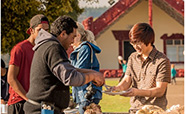 The Healthier Lives – He Oranga Hauora National Science Challenge is a national research collaboration dedicated to achieving healthier lives for all New Zealanders.
The Healthier Lives – He Oranga Hauora National Science Challenge is a national research collaboration dedicated to achieving healthier lives for all New Zealanders.
It undertakes collaborative research aimed at equitably improving the prevention and treatment of four major non-communicable diseases:
- Cancer
- Cardiovascular disease
- Diabetes
- Obesity
Our vision
He Oranga Hauora kitenga
Aotearoa hei whenua he ōrite ngā putanga hua hauora mō te tangata, kia iti iho hoki ngā pīkauranga o ngā māuiui kāore e taea te tuku ki te tangata kē.
Healthier Lives vision
New Zealand with equitable health outcomes and a substantially reduced burden of non-communicable diseases.
Many factors impact on the health of New Zealanders, including systems that affect the whole population, cultural factors that relate to particular communities, and the genetic make-up and life experiences of individuals.
Healthier Lives' research is therefore focussed within three themes:
- Healthy food and physical activity environments
- Culturally centred health interventions for Māori and Pacific peoples
- Precision medicine and personalised prevention
Email healthier.lives@otago.ac.nz
Web healthierlives.co.nz
Māori Indigenous Health Innovation (MIHI)
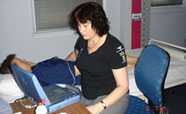 The Māori Indigenous Health Innovation (MIHI) undertakes and supports research that explores Māori health inequities and building excellence in research evidence that contributes to Māori health advancement.
The Māori Indigenous Health Innovation (MIHI) undertakes and supports research that explores Māori health inequities and building excellence in research evidence that contributes to Māori health advancement.
Research topics:
- Medical education research
- Chronic kidney disease
- Heart Health: The Hauora Manawa community heart study
- Respiratory disease
- Mental health
- Community service
Web otago.ac.nz/christchurch/departments/mihi
Ngāi Tahu Māori Health Research Unit
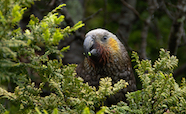 The Ngāi Tahu Māori Health Research Unit is a partnership between Te Runanga o Ngāi Tahu and the Dunedin School of Medicine of the University of Otago. The Unit collects, collates, interprets and publishes information, data and statistics on Māori health issues.
The Ngāi Tahu Māori Health Research Unit is a partnership between Te Runanga o Ngāi Tahu and the Dunedin School of Medicine of the University of Otago. The Unit collects, collates, interprets and publishes information, data and statistics on Māori health issues.
Email emma.wyeth@otago.ac.nz
Web otago.ac.nz/maori-health-research/
Mental Health Research at Otago
 Mental health is a broad and complex issue facing New Zealanders – and a research strength of the University of Otago. This website brings together our investigators and teams contributing to New Zealand's research achievement in the field of mental health.
Mental health is a broad and complex issue facing New Zealanders – and a research strength of the University of Otago. This website brings together our investigators and teams contributing to New Zealand's research achievement in the field of mental health.
Explore our mental health research:
- Alphabetical listing of our mental health research groups
- Māori and Pacific mental health
- Mental disorders
- Mental health risk factors
- Population mental health and health services
- Well-being
Web otago.ac.nz/mental-health-research
Otago Global Health Institute (OGHI)
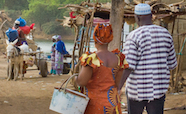 We aim to improve global health and save lives, by identifying and evaluating solutions to important health problems in low-resource settings.
We aim to improve global health and save lives, by identifying and evaluating solutions to important health problems in low-resource settings.
We work to address the world's most pressing health problems through research collaborations with low- and middle-income countries, and with disadvantaged groups in New Zealand.
We draw upon New Zealand's unique connections with Asia and the Pacific. Our extensive international partnerships and cross-disciplinary collaborations enable us to carry out innovative and rigorous research to advance global health.
Email globalhealth@otago.ac.nz
Web otago.ac.nz/global-health
Pacific Health Research at Otago
 Talofa lava, kia orana, malo e lelei, fakaalofa lahi atu, bula vinaka, malo ni, halo ola keta, mauri, fakatalofa atu, and warm Pacific greetings!
Talofa lava, kia orana, malo e lelei, fakaalofa lahi atu, bula vinaka, malo ni, halo ola keta, mauri, fakatalofa atu, and warm Pacific greetings!
We're celebrating our Pacific health research in the Division of Health Sciences.
Learn about what's going on in Pacific health research, how we can support researchers, and where to start if you're excited about research.
Email vot@otago.ac.nz
Web otago.ac.nz/pacific-health-research
Social Justice and Child Protection Research Network Aotearoa
The Social Justice and Child Protection Research Network Aotearoa (SJCPRNA) is an inter-disciplinary and inter-institutional research network focused on issues of equity within the child protection system.
We support research and scholarship pertaining to the study of inequalities in chances of contact with the child protection system, experiences of it, and differences relating to the outcomes for children and their whānau.
The persistent disproportionate representation of Māori is a key equity concern within the child protection system, and this network has Māori academics, policy makers and front-line workers in the network at every level, including Māori directors with long histories of multiple practice, personal and policy-level experiences within the child protection system in Aotearoa.
Email emily.keddell@otago.ac.nz
Web wixsite.com/sjcp
Te Rōpū Rangahau Hauora A Eru Pōmare
 Te Rōpū Rangahau Hauora a Eru Pōmare strives to create a Kaupapa Māori space committed to improving Māori health outcomes and eliminating inequalities through quality science and ongoing theoretical development. It takes a rights-based approach consistent with the Treaty of Waitangi, and is engaged with community through a spectrum of influence from community development, policy advocacy, research dissemination and Māori health research workforce development.
Te Rōpū Rangahau Hauora a Eru Pōmare strives to create a Kaupapa Māori space committed to improving Māori health outcomes and eliminating inequalities through quality science and ongoing theoretical development. It takes a rights-based approach consistent with the Treaty of Waitangi, and is engaged with community through a spectrum of influence from community development, policy advocacy, research dissemination and Māori health research workforce development.
Email bridget.robson@otago.ac.nz
Web otago.ac.nz/wellington/publichealth/research/erupomare
Tū Ora – Otago Falls Network
A University of Otago Research Network
Positive approaches to falls prevention tailored to communities
Our Otago Falls Network researchers are applying positive approaches to falls prevention research, attempting to avoid deficit approaches. Hence our name, Tū Ora (Standing Well).
A strength of our network of researchers is to support research that embraces indigenous and underserved communities. We also consider falls prevention from a lifecourse approach with a focus on increasing quality of life throughout the lifespan.
Web otago.ac.nz/research/centres/otago0244591.html
Featured research projects
Dental disadvantage
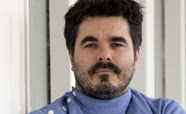
Associate Professor Jonathan Broadbent discusses the results – and long-term implications – of dental data gathered by the Dunedin Study.
Dental disadvantage, see Otago Magazine, Issue 46
Heart of the family
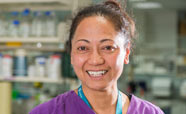
The Pasifika Heart Study aims to find out how the risk profile of South Island-based Pacific Islanders differs from those living in Auckland.
Taking action

Te Ara Auahi Kore (TAKe) is a new research programme seeking to understand – and reduce – disproportionately high rates of smoking among Māori.
Inequalities in testicular cancer
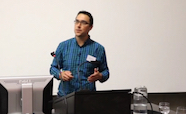
Dr Jason Gurney is exploring New Zealand's unique incidence patterns of testicular cancer.
Presented video and powerpoint
Inequalities in testicular cancer (video approx 16 mins)Inequalities in testicular cancer (PDF 4.5MB)
Puzzling disparity
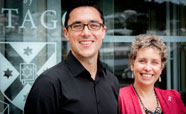
Read more about Jason's research on testicular cancer in He Kitenga.

